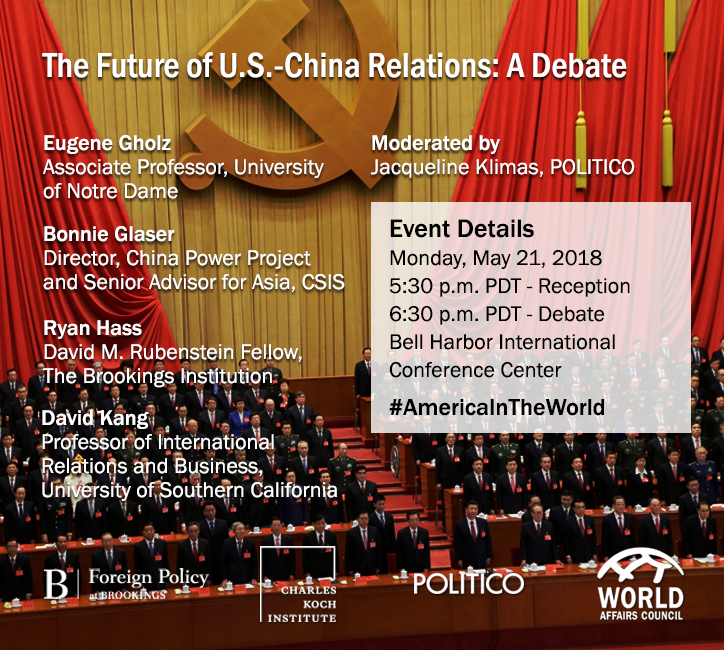The Future of U.S.-China Relations: A Debate
May 21st, 2018 5:30PM -8:00PM
On Monday, May 21, the World Affairs Council of Seattle will host a debate on the future of Sino-American relations. This debate, convened by the Brookings Institution’s Foreign Policy program and the Charles Koch Institute, in partnership with POLITICO, is the fifth in a series of thematic debates on America’s role in the world.
Hosted in cities around the United States, this series seeks to foster a vigorous, civil and constructive national discussion on the future of American foreign policy. The Seattle debate will address the future of relations between the United States and China, the nature of American interests in the Asia-Pacific, and how the United States should engage diplomatically, military, and economically in East Asia in the 21st century.
Jacqueline Miller, president and CEO of the World Affairs Council, will provide opening remarks. Mona Locke will serve as local moderator, introducing questions from the audience and Twitter.

Agenda:
Reception, 5:30-6:30 PM; Debate, 6:30-8:00 PM
Debaters:
- Eugene Gholz, Associate Professor of Political Science, University of Notre Dame
- Bonnie Glaser, Senior Adviser for Asia, CSIS; Director, Project on Chinese Power, CSIS (@BonnieGlaser)
- Ryan Hass, David M. Rubenstein Fellow, Foreign Policy, Center for East Asia Policy Studies, John L. Thornton China Center (@ryanl_hass)
- David Kang, Professor, International Relations and Business, University of Southern California; Director, Korean Studies Institute, University of Southern California (@daveckang)
Jacqueline Klimas, national security reporter with POLITICO, will moderate the debate. (@jacqklimas)
Mona Locke will be the local moderator, introducing questions from the audience and Twitter.
All are welcome to submit questions and join the conversation on Twitter at #AmericaInTheWorld.
Video from previous debates in St. Louis, Las Vegas, and Atlanta can be found on the Brookings webpage on the debate topics of “America’s changing role in the world”, “The changing role of America’s military,” and “the future of transatlantic relations.”